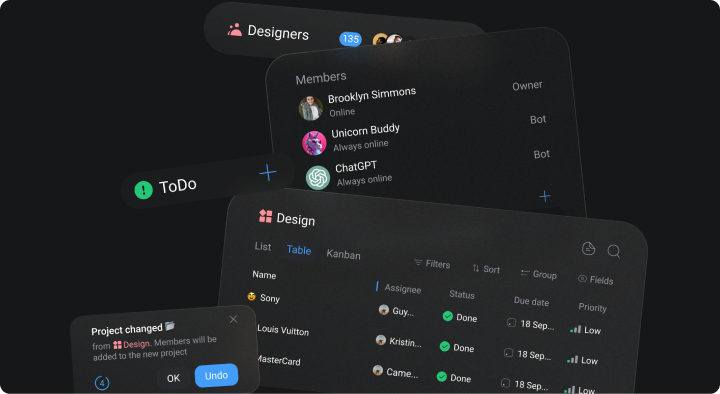10 Collaboration Skills Every Teammate Should Master
What skills should teams cultivate to make collaboration great again?
Teamwork has always been, and remains, a key element of getting things done — no matter what industry you're in. Whether you're part of a distributed team, in a hybrid setting, or in the office, smooth collaboration and instant understanding of each other are more important than ever. But teamwork doesn't happen overnight — it starts within oneself and develops through the right skills.
We'll cover the top ten teamwork skills everyone should cultivate to set an example in teamwork and make collaboration great again.
(1) Communication
It all starts with communication. If you lack this skill, working with others becomes a lot harder. What defines a good communicator? Being one means not only sharing your thoughts clearly but also creating space for others to be heard. After all, communication is about understanding what your team needs and making sure you're all on the same page.
(2) Attentive listening
As we agreed, communication is more about listening than talking. And not just any kind of listening — active listening. When practicing active listening, you give your full attention to the person speaking, ask questions, and show that you understand. This way, your teammates will know that you care, that their opinions matter, and they will feel more trusted.
(3) Adaptability
Projects change, deadlines shift, and sometimes new priorities pop up out of nowhere. Things don't always go as planned; we all know that, and we all get used to it. But how to handle these shifts elegantly and master adaptability is something only a few of us know. This skill allows you to go with the flow and adjust to changes without losing focus.
(4) Conflict resolution
Disagreements always happen. It doesn’t mean your team is bad or that you’re a bad manager. Clashing with opinions is a part of human nature. What really matters is how you handle those disagreements. Developing conflict resolution skills is the answer.
(5) Time management
Working in a team often means juggling multiple tasks and deadlines. Advanced time management skills make it easier to prioritize tasks, manage schedules, and handle deadlines.
(6) Problem-solving
Every project comes with its own set of challenges. That's why being a good problem-solver equals bringing value to any team. Problem-solving means contributing to coming up with solutions and not being afraid to get creative.
(7) Accountability
It's about owning up to your work and taking responsibility for your actions, tasks, and mistakes. When every teammate knows that the professional environment is reliable, projects move faster, and trust builds naturally.

(8) Collaboration
This might seem obvious, but it's worth mentioning: teamwork is about working together, not on your own. That means being open to other people's ideas, giving constructive feedback, and creating frameworks for common ground.
(9) Patience
Let's be real for a second — working with others can be frustrating sometimes. People differ in many ways, from work styles and opinions to the ways of doing things. What helps here? Patience.
(10) Leadership (valuable for all roles)
Leadership isn't just for managers. Leadership is about taking initiative, supporting others, and being proactive. It's about stepping up when needed and helping guide the team toward success.
How Orchestra develops these skills
If you're on a mission to improve teamwork, Orchestra is a powerful collaboration tool that handles context switching. Teams can also:
- Create separate spaces for teams and projects.
- Keep topic-based communication in chats connected to project boards.
- Communicate more smoothly with built-in voice & video calls.
- Stay on top of tasks with elegant task boards.
- Keep projects organized with shared & customizable workspaces.
Once again, teamwork is about mastering skills. When you pay attention to the way you:
- Communicate.
- Listen to others.
- Handle work shifts.
- Resolve conflict issues.
- Take responsibility for your tasks.
- Stay open-minded, patient, and proactive.
You become a great team member, leading by example of how teamwork should be.

